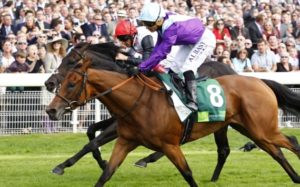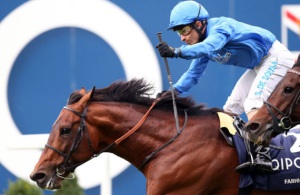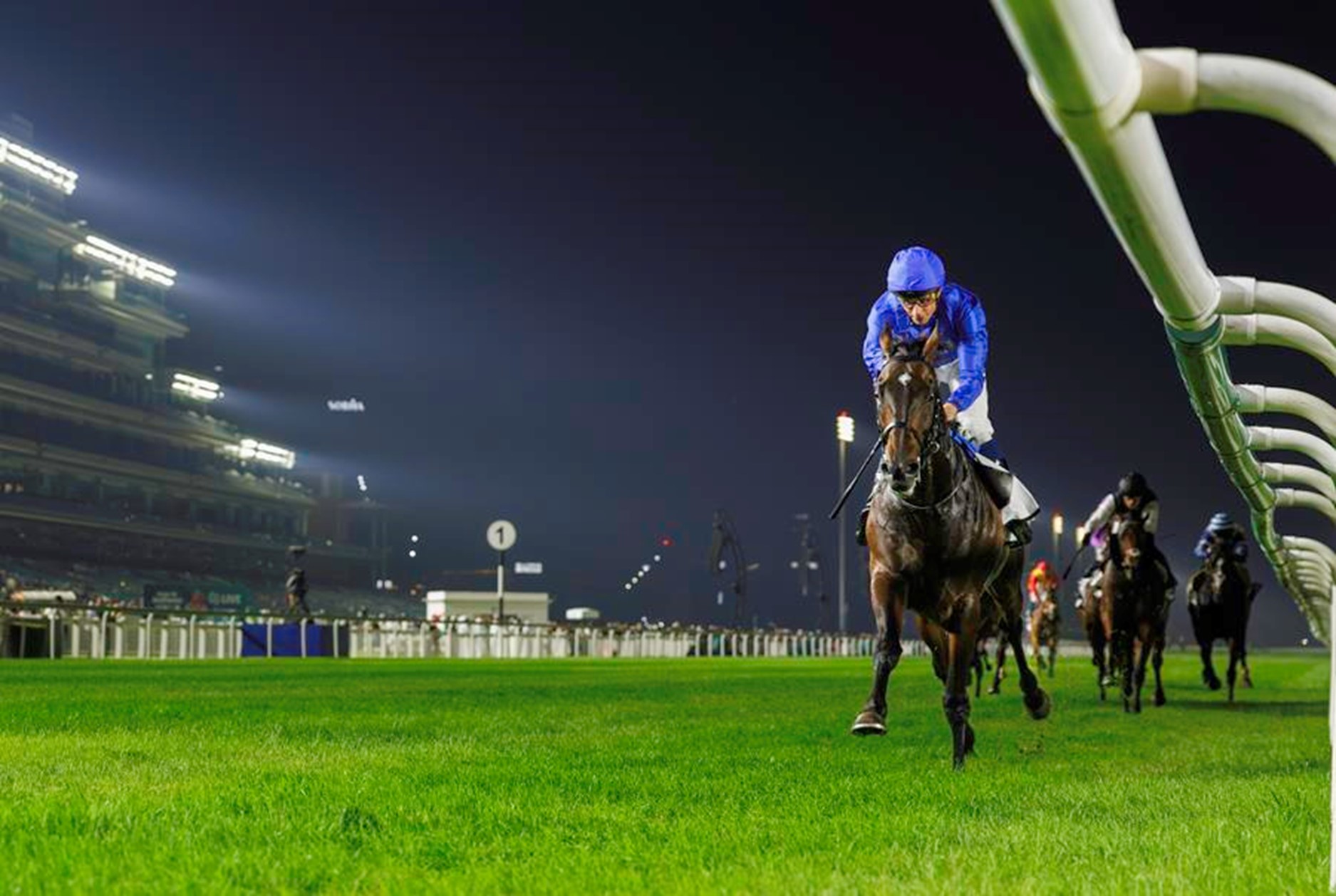It is so easy to forget that every horse has a chance, not least when the odds-on favourite for a Group One event is an unbeaten Derby winner like Golden Horn. But there is at least one script that casts any one of the runners in the leading role, and the one that played out here on Wednesday left Arabian Queen as the winner of the International Stakes and Golden Horn beaten for the first time in his life.
Golden Horn was sent off at 4-9 to extend his record to a sixth victory and the third Group One success of his career, while Arabian Queen was a 50-1 shot, beaten in five of her last six races. To win, she needed every twist of chance to run in her favour and a perfectly judged ride by Silvestre de Sousa, but this was her day and the victory well deserved.
From the off, her chance improved as Dick Doughtywylie, in the race to make the pace for Golden Horn, completely missed the break. Robert Havlin, his jockey, then seemed to overcompensate by racing Dick Doughtywylie into a clear lead, which in turn allowed Arabian Queen, in second, to settle much better than in several races earlier this year.
In effect, De Sousa was able to ride a front-running race in second place, going easily a couple of lengths ahead of Golden Horn, who did not settle as readily as the eventual winner.
De Sousa could then choose his moment to strike for home, and on rain-softened ground that had already seen Gleneagles, the 2,000 Guineas winner, taken out of the race a couple of hours before the off, Golden Horn struggled to impose his quality and close the gap.
Inside the final furlong, Golden Horn hauled himself level but the effort left him with no response when Arabian Queen pulled out more to win by a neck.
The Grey Gatsby, who was three-and-a-half lengths behind Golden Horn in the Eclipse, ran to within a few ounces of that form back in third, while Time Test, an impressive winner at Royal Ascot in June, was only fourth.
Arabian Queen’s victory owed much to the unusual way the race developed and also the rain on Tuesday that turned the ground good-to-soft. But it was a tactical triumph for De Sousa, who will surely be the champion jockey for the first time this season, and further confirmation that David Elsworth, Arabian Queen’s 75-year-old trainer, is one of the finest all-purpose trainers the sport has seen.
Elsworth has just one championship to his name, over jumps in 1987-88 when Desert Orchid was at the height of his powers and Rhyme ’N’ Reason took the Grand National. But Elsworth is also a multiple winner of Group One races on the Flat, including the International Stakes exactly a quarter of a century ago with In The Groove, who also won the Irish 1,000 Guineas, the Champion Stakes and the Coronation Cup.
Elsworth did not appear for the presentation or to talk to the media after the race, according to one account because he felt a little slighted by the lack of attention on his filly beforehand. He did say a few words after saddling his runner in the following race, however, underlining that Arabian Queen is “a filly of the highest class”.
“She’s tenacious and she loves to battle,” Elsworth said. “If we hadn’t turned up today, they would be hailing the favourite as the best since Frankel.
“It’s a certainty [that she will stay further than the mile and a quarter of the International]. Her dam [Barshiba] got a mile-and-a-half and she won the Lancashire Oaks twice, and it took me three years to find out her best trip, I’ve been a bit quicker with this one.”
Jeff Smith, the winner’s owner and one of Elsworth’s most enduring supporters, hopes to see Arabian Queen line up for the Prix de l’Arc de Triomphe at some stage, but probably not until 2016.
“I was very hopeful that we’d be in the first three,” Smith said. “Going back to the form book, there’s no line between three-year-old colts and three-year-old fillies. We all automatically assume that because we’ve got a Guineas winner and a Derby winner with good form, they are automatically better than the fillies and it doesn’t follow.
“Legatissimo [the 1,000 Guineas winner] is exceptional and the French filly [Ervedya] is also exceptional and we’re up there with them but on an improving curve.
“We are in the [Group One] Fillies and Mares at Ascot [on Champions Day in October] and that would probably be it for the year, and then next year we will possibly train for her for the Arc.”
Gosden has said several times this season that he expects every horse to be beaten at some stage and took Golden Horn’s first defeat on the chin. “Our fellow was fresh and keen early on and basically did too much,” Gosden said. “He gassed himself out in the ground, got in front of the filly and then just tired in what is dead ground.
“There’s no doubt that he’s much better on faster ground, but take nothing from the filly, she’s outstayed them all well and if you look back to The Grey Gatsby, you see the form still there from the Eclipse. It’s just a pity that it rained, it was a pity for Gleneagles and a pity for this horse as well.”
The ante-post markets reacted more sharply than the trainer to Golden Horn’s defeat, and the Derby winner can be backed at 10-1 to add the Arc in October to his Classic success in June. Treve, the Arc winner for the last two seasons, is top-priced at 9-4 to record an unprecedented hat-trick, while Jack Hobbs, the Irish Derby winner and a stablemate of Golden Horn, is second-favourite at 8-1.
Storm The Stars moved to the front of the betting for the St Leger next month after a brave success in the Group Two Great Voltigeur Stakes, but had to survive a long stewards’ inquiry after carrying Bondi Beach across most of the track in the closing stages. Storm The Stars was half a length in front at the line, and had the margin been any less, this might have been a rare example of a result on a British track being overturned by the officials.
“If he was a human being he’d have green hair and earrings in his nose and through his eyebrows, but he’s a genuine horse,” William Haggas, the winner’s trainer, said. “He’s a bit of a rebel. But he’s definitely tough and when the chips are down, he goes for it, and that’s all you want, really. He always gives himself a hard race because he’s a galloper, but he’s a good galloper.”
Haggas had two runners on the card and left York with a double, initiated by Recorder in the Group Three Acomb Stakes.
The winner, who is owned by the Queen, is by Gaileo out of Memory, a Group Two winner as a juvenile, and is likely to step up to Group One company next month in the National Stakes at The Curragh.
www.theguardian.com












